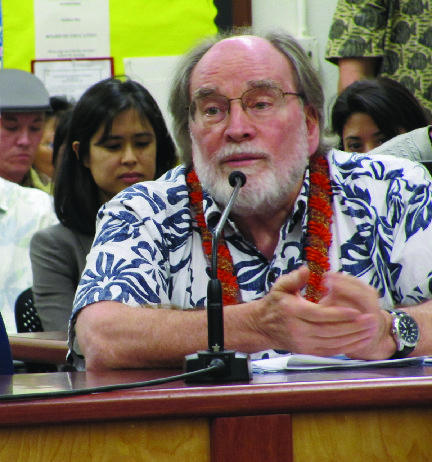LIHUE — Gov. Neil Abercrombie announced Monday that the state will put forth standards and guidelines for seed and diversified agriculturalcompanies to voluntarily comply with certain health and safety requests of the Kauai community. The hotly-debated topic shouldn’t be decided
LIHUE — Gov. Neil Abercrombie announced Monday that the state will put forth standards and guidelines for seed and diversified agriculturalcompanies to voluntarily comply with certain health and safety requests of the Kauai community.
The hotly-debated topic shouldn’t be decided at the county level, according to the governor.
“Kauai legislators and members of my administration have been discussing current issues regarding agriculture on the island of Kauai, including residents being informed about activities in their immediate area,” Abercrombie said in a press release.
“We collaborated with the Kauai delegation and farmers about taking steps to address the concerns of the community.”
Those steps will include disclosure of aggregated usage of restricted-use pesticides and the implementation of setbacks from schools and hospitals when they’re being used, according to the release.
The safeguards would be voluntary for the companies.
“Farmers will comply on a voluntary basis with temporary standards until such time as department heads and stakeholders can develop necessary rules or legislation for next session,” Abercrombie said.
Kauai County Councilman Gary Hooser, who co-introduced a bill earlier this year related to the pesticides and genetically modified organisms, said Abercrombie’s announcement came at an “interesting” time.
The council’s Economic Development (Agriculture) Committee is set to resume its discussion on Bill 2491 Friday morning.
While Hooser is pleased to see the state expressing an interest in a problem that has been neglected for years, he said the standards Abercrombie wants to implement do not go far enough. And since it is voluntary, it doesn’t really require anything, he said.
“While I am happy that the state is finally taking some action, there needs to be much more,” he said.
As for the usage of restricted use pesticides, Hooser said that represents roughly 20 percent of the total pesticides used by the largest agricultural companies on Kauai.
Abercrombie said Kauai Mayor Bernard Carvalho Jr., and Kauai County Council Chair Jay Furfaro have been notified of his intentions.
But Hooser said Monday’s announcement was news to him.
“(Abercrombie) has not spoken to me and, to my knowledge, hasn’t spoken to anyone involved in the advocacy of the bill,” he said. “I have not been notified, nor has it been discussed.”
The governor’s press release was issued late Monday afternoon and representatives there couldn’t be reached for comment.
Before making a final decision, Hooser said he would encourage Abercrombie to sit down with doctors at Kauai Veterans Memorial Hospital in Waimea, local pediatricians and those involved in the ongoing lawsuit against DuPont Pioneer.
“Delaying putting into place measures for the health and environment of our community is not an acceptable solution,” he said. “We need to put those in place now.”
If passed, Bill 2491 would require Kauai’s largest agricultural companies — namely DuPont Pioneer, Syngenta, Dow AgroSciences, BASF and Kauai Coffee — to disclose pesticide use and genetically modified organisms. It would also create 500-foot buffer zones around public areas and waterways and imposes a moratorium on the expansion of GMO fields and open-air testing until the county completes an environmental impact study.
Hooser said the governor’s proposal calls for “a very small portion” of what’s being asked for in Bill 2491.
Earlier this year, the Legislature passed House Bill 673, which Abercrombie signed into law as Act 105 in June, requiring the state Department of Agriculture to post certain information regarding restricted-use pesticides on its website, according to the release. The act also requires the Hawaii Legislative Reference Bureau to conduct a study on other states’ reporting requirements for non-restricted use pesticides.
“We believe that this law, in addition to existing usage requirements posted on pesticide labels, will help to address the concerns raised as they pertain to pesticide use and transparency,” Abercrombie said in the release. “In January, we can look into codifying law regarding disclosure and setback requirements in the context of protection of public health and safety.”
Carvalho said the county is looking forward to hearing more details about how the state intends to establish and implement new disclosure requirements and buffer zones.
“Addressing these issues will take the collaborative effort of many stakeholders, but I believe that working together, we can make it happen,” he said. “This is a huge step in the right direction. Mahalo to the governor and our legislative delegation for stepping in to offer solutions.”
Abercrombie also said in the release that he would work with the Legislature to restore positions within and seek additional funding for the DOA and the Department of Health’s Environmental Health Administration, particularly for the neighbor islands, to address pesticide compliance and conduct inspections regarding pesticide contamination, and ensure that inspections are conducted in a timely manner.


